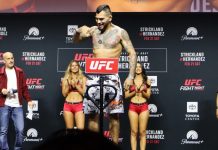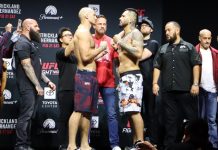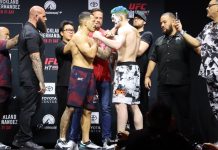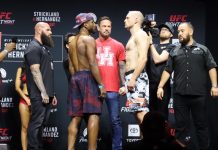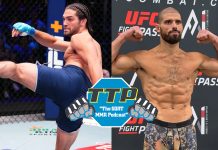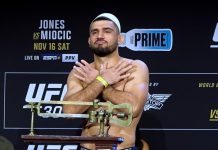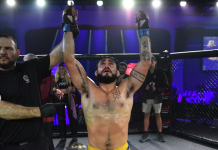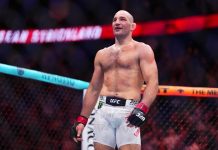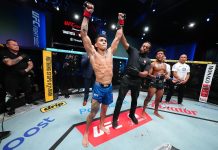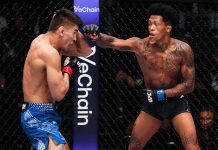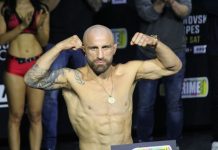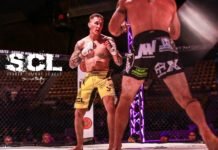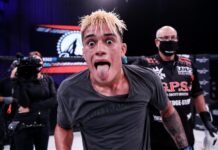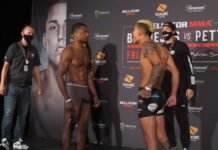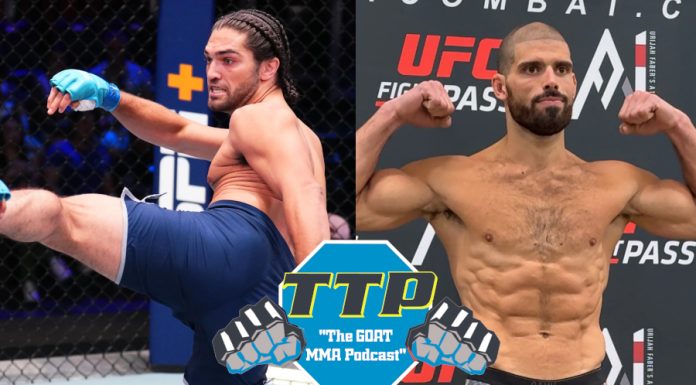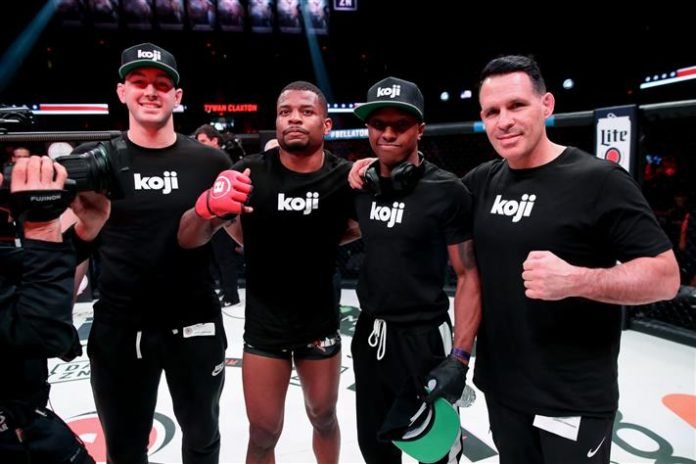
‘Air’ Claxton is set to land in Honolulu, Hawaii this weekend at Bellator USO — which he will enter after having made some big changes to his training camp.
Last time he entered the Bellator MMA cage, Tywan Claxton was confident he could overcome former title challenger Emmanuel Sanchez in the opening round of the featherweight grand prix. At Bellator 226 in September, Sanchez proved otherwise, submitting Claxton in the second round.
It was the first loss of ‘Air’ Claxton’s career. And it served as a teaching point to a talented fighter who was, perhaps, in need of just such a wake up call to bring him to the next level.
Claxton (5-1) returns this Friday at Bellator 235, the promotion’s Salute the Troops show. Bellator USO, with its scenic backdrop of Hawaii, may seem like a vacation, but when Claxton comes to town, it’s all business — with a renewed focus.
“I took away a lot from that Sanchez fight. I made a lot of big changes,” he told Cageside Press ahead of his fight against Braydon Akeo, an undefeated Hawaiian making his Bellator debut.
Among them, “I need to make sure I’m in total control when I take a guy down,” he said. “I need to be comfortable at all ranges on my feet, I need to be comfortable with guys pressing me.”
Or, more concisely, “I need to be comfortable being uncomfortable.”
To get to that point, Claxton has made some important changes to his training camp. “Now I have a head coach. I promoted my striking coach to my head coach,” he revealed. A head coach is something he went without, previously. “I also went out and found guys that could press me like that and make me uncomfortable.” One of those training partners is Montana Love, an undefeated pro boxer with eight KOs who Claxton called a “merciless guy.”
“I have my old wrestling coaches come in now, they run a couple of training sessions for me,” he added. “Grappling sessions that I was running before.”
Claxton has has begun working his mental game again as well. Reading. Studying. “I’m watching film now. I watch a lot of film, I study fights. I study fighters.”
The changes mean he’s also getting some honest feedback about where he’s at. Something that was perhaps lacking in the past. Shedding some light on that, Claxton said that “I’m the type of person that, only certain people can tell me what to do. And only certain people I will listen to. If you grow up how I grew up, there’s always adversity, there’s always somebody saying you can’t do something.”
That childhood experience led to a guarded outlook for Tywan Claxton. “Until you invest in me, until you show that you really care, you’re not allowed to talk to me that way,” he explained. And, the talented featherweight added, “for the most part, I was winning. So I was coaching myself. You can say what you want to say, people can say ‘oh that was a horrible idea’ but the only guy that’s beat me is a guy that had just fought for a world title. So maybe I was doing enough to beat 80% of the guys in the division, but maybe not the top 20%.”
80/20, 90/10. Whatever the percentage, said Claxton, he “had to get those coaches around me so that we can be prepared to continue to grow, to beat everybody in the division.”
Problem Solving
If you know Claxton at all, you’d recognize his approach following the Sanchez loss. He approached it from a problem solving perspective, the way he would tackle a problem in his other career — app development. “It’s just like coding. You find a bug in the code, you debug the code. I debugged my training. My entire training philosophy and program got debugged.”
In short, “This is what went wrong, let’s fix this sh*t. That’s exactly how I approached this camp, that’s exactly how I approached this comeback. After the Sanchez fight, it’s a direct change.”
Handling defeat is something that differs from athlete to athlete, person to person. Claxton isn’t the type to take any time off. Instead, “I went on kind of a psychotic rampage I suppose, where I just wanted to go break every f*cking body I could in my gym,” he recalled. “I just wanted to sit there and bang. I wanted them to feel how I felt, being pushed by Sanchez. I wanted to go in there and break guys every day — I didn’t care about technique, I didn’t care about getting hit, I didn’t care about anything. I just wanted violence, and wanted to make them feel how I felt. And that was my coping mechanism. I cope with training.”
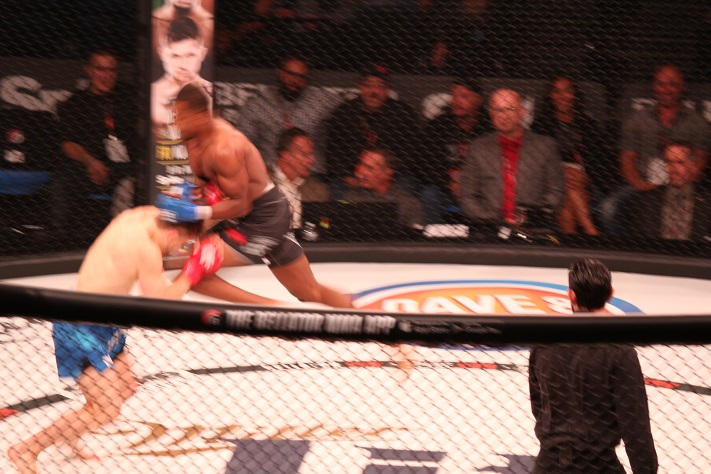
Thriving in Hostile Environments
Braydon Akeo is fighting at home at Bellator USO. The crowd will have his back. And it makes no difference to Tywan Claxton. “That sh*t doesn’t matter,” he said, asked if fans and media sometimes read too much into athletes fighting at home. “I was always the person that thrives in hostile environments.”
“Whether the crowd cheers for me or they don’t cheer for me, that doesn’t really matter. It’s just about finding your groove,” he added. “If your groove is second nature to you, and you can get into your groove no matter what the circumstances are, then it doesn’t really matter where you’re fighting at.”
It’s not that there’s no benefit at all to competing at home, mind you. It’s just that any such benefit is negligible. “The only advantage he may have is that his sleep schedule may be better than my sleep schedule. That’s it,” Claxton explained. “It’s a business trip. I’ve wrestled my entire life. When you’ve wrestled and traveled that many times, and you’ve gone and competed against people all over, it doesn’t matter.”
“Home court advantage is not a thing,” he finished.
Akeo, of course, is not someone he’s about to overlook, fighting at home or not. Examining his opponent, Claxton observed that “I think he relied heavily on his wrestling. I think that if I had to say it, his striking style is trying to emulate someone like Max Holloway.”
“I think he’s used to being a bully, but he’s used to being a bully with wrestling,” Claxton added. Of course, Claxton himself comes from the wrestling world. “He ain’t going to bully me with no goddamn wrestling, and he ain’t going to bully me period. There’s levels to the game, and there’s levels to guys that you fight. I don’t think he’s fought anybody close to the people that I’ve fought.”
“I think he’s tough, I think he’s a tough fighter, he’s coming out hot, I know for a fact he’s coming out there to fight,” added Claxton. “Three-time state champ, it is what it is. But like I said, there’s levels to guys that you fight. Check my track record. Every guy that I’ve fought is a hell of a fighter.”
The Lighter Side of Fighting
Fighter, coder, comedian? Fights and apps are among Claxton’s goals for 2020 but so is something a little more off-beat: a stand-up comedy performance.
Asked what drew him to the idea of stand-up, Claxton explained that his life experience, as bumpy as some parts have been, drew him in. “You ever just watch comedy and you realize, ‘I’m the type of person that’s okay with all the f*cked up sh*t that’s happened to me in my life, and making fun of it?’ Because I can laugh at myself. I started watching a lot of comedy and I’m like man, if I tell half of the stories that life has just kind of thrown my way, oh my god, I could be the next Kevin Hart,” he said. “So I’m going to give it a shot.”
After all, he added, “Why not? Why not just go out and try it? What do I have to lose? If I’m good, great. If I suck, hell at least I can fight, and I know how to code.” Ultimately, he said, it’s a bucket list thing.
Asked which seems scarier, getting in the cage and fighting, or comedy, Claxton replied without hesitation. “Definitely the comedy!”
If you’re telling a joke and the response is dead silence, there’s not much you can do about it, he pointed out. Fighting is something Claxton has been doing his whole life, however. That’s normal. “Going and telling jokes, that ain’t too normal.”
Tywan Claxton returns Friday, February 20, 2019 at Bellator USO (Bellator 235) at the Neal S. Blaisdell Arena in Honolulu, Hawaii.

